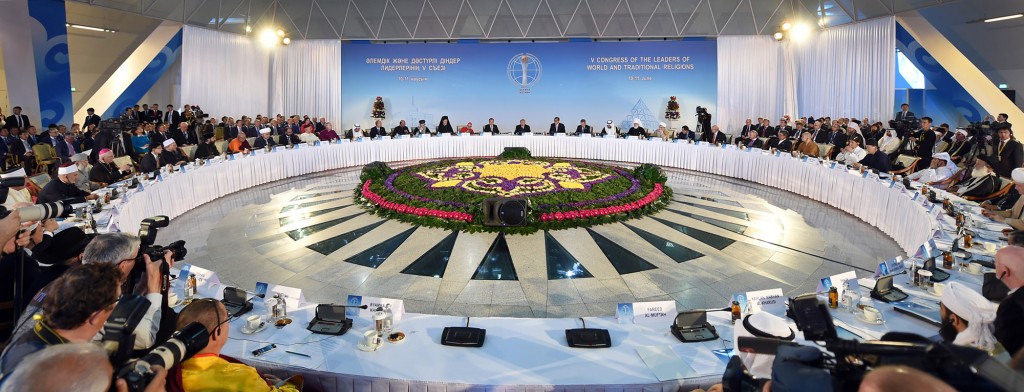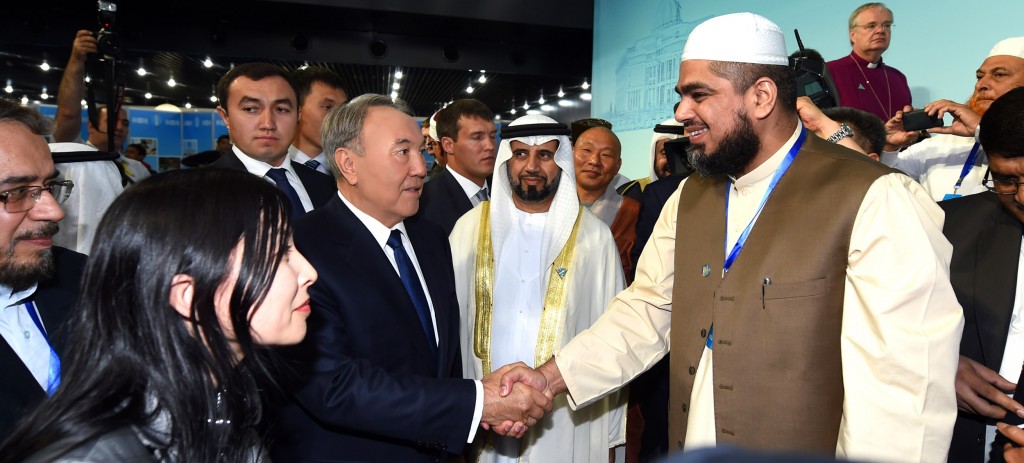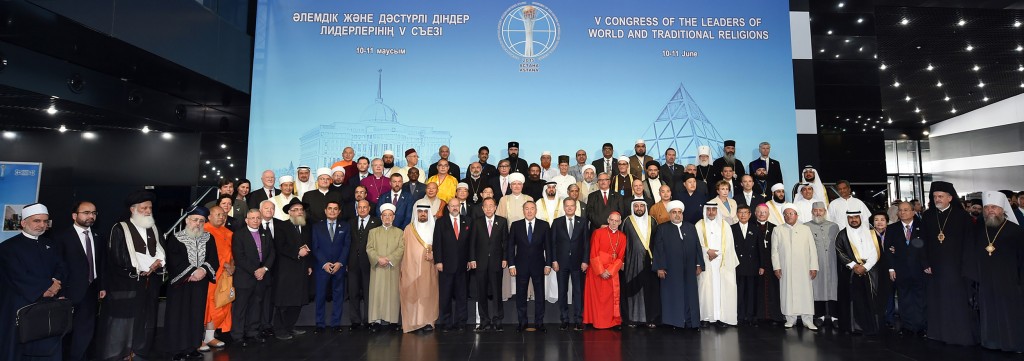ASTANA – The fifth Congress of World and Traditional Religions launched June 10 in Astana with a focus on working together to prevent violence, and with Kazakhstan offered as a model of religious and cultural harmony.
“A distinctive feature of this forum is to discuss the relationship of religions and cultures in the interests of peace and stability on the planet,” said President of Kazakhstan Nursultan Nazarbayev in his speech to the plenary session of the congress. “The relevance of such a discussion is enhanced by the disturbing development of the global situation. Today, the world is literally hanging in a dangerous state of uncertainty.”
Delegates to the congress repeatedly condemned violence in the name of religion, with Nazarbayev saying that attempts to use Islam to justify extremism and terrorism are “blasphemous,” and said any religion is “great” if it supports peace and unity.
The fifth congress is being attended by delegations from more than 40 countries, as well as by UN Secretary General Ban Ki-moon and President of Finland Sauli Niinistö. The first day’s panel sessions included “Religious and Political Leaders: The Responsibility to Humankind,” and “The Influence of Religion on Youth: Education, Science, Culture and Mass Media.”
UN Secretary General Ban Ki-moon, addressing the congress, commented on the role of religion in “a world in transition.” With urbanisation and migration rising and a need for equitable development, the global security landscape is in a state of flux, he said.
“We face enormous opportunities. We are the first generation that can end global poverty and the last generation that can address global warming before it is too late. But we also face enormous risks,” Ban said. “Civil conflicts, terrorism, organised crime, drug trafficking and health crises threaten millions of people. These dangers transcend national borders. … Religious leaders – traditional and non-traditional – have a pivotal role to play. In times of turmoil, religious leaders can provide a values-based glue to hold communities together and provide common ground for peace-making and problem solving.”
This can be done by fostering dialogue, encouraging kindness and promoting shared values, Ban said. “The world’s religious leaders must teach their followers the true meaning of reconciliation, understanding and mutual respect. Religious leaders have an obligation to speak out when so-called adherents of their faith commit crimes in its name.”
Other speakers noted the congress’s potential to keep dialogue going in a time of conflict, and to generate ideas to pass on to decision-makers. Head of the World Forum of Islamic Schools of Thought Ayatolla Mohsen Araki of Iran, speaking at a press briefing after a panel session, said, “This conference is very beneficial to give some solutions or some ideas to solve the problem between religions, between people who follow this faith or that faith.” He also commented that the conference could, being based in a Muslim country, present an Islamic route to peace in particular.
However, he noted, “the real problem is politics, it is not religious. … Politicians have to do something to solve the problems in Syria, in Iraq, in Yemen. … The most important thing is that politicians, especially the politicians in superpowers, don’t have a very strong will to solve the problem. They benefit from this problem in our region. They benefit from the clash … between different religions,” he said. If politicians could be united, he said, solutions would not be difficult to solve. “[But this congress can] come and give some practical solutions for problems between countries, between sects, between different faiths in this region and our region. And I hope that this conference can do something in this field.”
Nazarbayev, in his remarks, commented on the importance of developing a new security paradigm. This dialogue “has to include the principles of equality, mutual respect and respect for interests of each other, cooperation, tolerance and mutual understanding. There is no alternative to dialogue in all spheres in the 21st century,” he said.
He urged that all military conflicts be stopped, with conflicting sides negotiating their truces. Exertions of power in setting conflicts must be stopped, and political leaders must stop “spreading distrust in the modern world.”
The President also took the opportunity to again criticise sanctions – which have recently been levied by Western countries and Russia against each other. Sanctions must also be stopped, he said, noting that they affect “third countries and ordinary people.”
The President also called for mass media and the Internet to no longer be used as mouthpieces for hatred. “We have to increase the moral responsibility of owners of the mass media and all those who call themselves the fourth power,” he said, recalling one theme of the day’s discussions.
Nazarbayev offered Kazakhstan as an example to the delegations of the congress. “We have shown the world that the fatal inevitability of conflict of religions and cultures does not exist in our society,” said “Therefore, they can be avoided and at any level of international politics. We have demonstrated that tolerant attitudes within society are the question of conscious responsibility of the state and religious organisations, and ordinary citizens. … [T]he Congress of Leaders of World and Traditional Religions, we view through the prism of global recognition of the success of our experience.”
Jean-Louis Tauran, president of the Pontifical Council for Interreligious Dialogue in the Roman Curia, echoed the sentiment when he called Kazakhstan an example of a society that remains secular yet respects religious differences.
